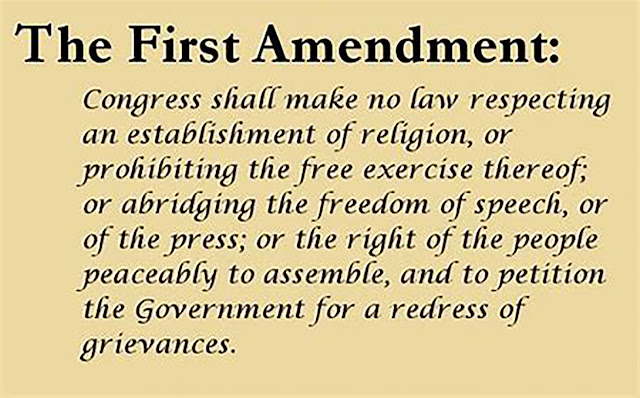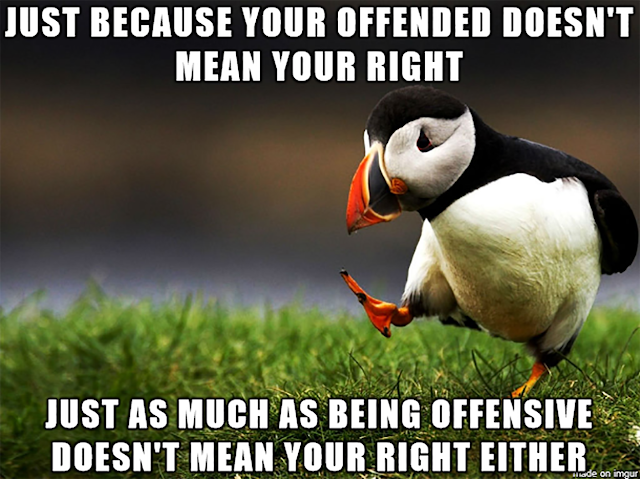Do we really have as much freedom of speech as we think? Do we have more than we realize? Or have we misunderstood the whole concept? Two weeks ago, I started a series of posts on the First Amendment to the United States Constitution. Last week I discussed “When Speech is a Crime,” exploring the exceptions to the First Amendment.
Now might be a good moment to remember what the First Amendment actually says.
 |
Many thanks to Indivisible Door County WI. |
In my first post of this series, I asked, “Is the First Amendment an aspiration, or a reality?” I got some pushback in comments online. As one commenter put it, “Of course the First Amendment is a reality. It’s the law!”
But that might be an “alternative fact” in daily practice. The founding documents also say “all men are created equal,” and there’s a culture-wide concept that “equal justice under law” is a guiding principle. We haven’t even come close to getting those right, yet. Kinda like with the slaves in Texas between the Emancipation Proclamation and Juneteenth. Just ‘cuz they wrote it, that “don’t mean we got it.”
Freedom of speech, and its limitations
As with all broad declarations of principle, the devil lurks amongst the details. Turns out, freedom of speech is a thorny issue, even (or perhaps especially) in the USA. The section of the First Amendment relevant to today’s post says, “Congress shall make no law . . . abridging the freedom of speech . . . .”
 |
| Courtesy of "Relatably." |
That all seems pretty straightforward. But even when the speaker is not committing a crime, s/he may hesitate to say something. There are times when even protected speech may technically be legal—but it also may be socially “not okay.”
Political correctness and “Cancel Culture”
In recent decades several terms have bubbled up from the cultural ferment: “Politically correct,” “cancel culture,” or "call-out culture." Sometimes people abuse their new power gained through "the leveling effects of social media." But still I agree with Spencer Kornhaber that it's less a matter of "cancellation" than accountability.
Whatever you call it, these terms are used defensively. They push back against a changing social norm that abhors racist, sexist or gender-identity-denigrating speech or actions.
 |
| Courtesy of Parentology. |
The pushers-back complain that these shifting social norms result in a climate that stifles freedom of self-expression. An excellent recent example of this can be found in a letter that, while set to be published in the October 2020 issue of Harper’s Magazine, has already found its way into wide circulation. The inevitable response to this pushback also is easy to find.
Many, including several prominent comedians, have protested that political correctness “kills humor.” Those who disagree counter by saying what’s dying is out-of-date schtick that relies on bigotry for humor. More on that below.
Thought police? Really?
The complainers also say the country is more and more pervasively dominated by “thought police.” That to step out of line, especially on college campuses, is to risk scorn, ridicule, and ostracism. The critique of campus culture has some merit, as far as it goes. Sometimes unpopular speakers, especially those who support white supremacy or are known for hate speech, are booked for events on some college campuses. Almost inevitably, students have raised loud protests.
This back-and-forth has led to conservative-leaning students saying they feel unwelcome in some classes. They report being afraid to speak their views in classrooms or campus forums, for fear of being shouted down or shunned. The liberal-arts ideal of a “marketplace of ideas” never included this.
 |
| Courtesy of Minds Media. (Might note that Chomsky signed the Harper's letter.) |
A short “Political Correctness” debate
Lest this discussion get too heavy, let’s pause for a short “political correctness” debate in the form of a meme war. Contemporary social media culture seems awash in such soundbite messaging. And memes fly in especially thick flurries and flocks when it comes to political correctness. Why not let the memes duke it out?
 |
| (Clockwise: Politically Incorrect Humor, Lather, via MemeCenter, and Meme Generator) |
 |
| (Clockwise: SomEEcards, and "Chris1787763," QuickMeme, and Claire's Passion Blog/Ampersand by B. Deutch.) |
 |
| (“unusedimgur,” via Imgur) |
There now. Who says humor is dead? There are times when we may be tempted to side with the Puffin. Unfortunately, the puffin meme supports a false equivalency.
The philosophical throughline: underlying bigotry
As far as I can tell, there’s one huge problem with the arguments against political correctness. It lies in the kind of “truth” and “humor” they defend.
The “freedom” they desire often turns out to be the freedom to use racist or homophobic language. The “truth” they defend all too often isn’t objective truth, but derisive racial or gender-identity stereotypes. The “humor” they want to keep alive boils down to racial slurs and ethnic jokes.
Dig down to the bottom of the “anti-P.C.” arguments, and you’ll mostly find white privilege defending hate speech.
You may be surprised to learn that hate speech normally is protected speech—at least, in the United States. Mind your expressions of racial hate in other parts of the world, though.
Hate Speech, the ultimate “not a crime but not okay.”
Defined as “distasteful, offensive, or hateful speech that causes others to feel grief, anger, or fear,” hate speech truly does offend. But as long as people stop short of hate crimes, they can say pretty much any awful thing they want to.
And they definitely do say despicable things. There are lots of reasons why, but it all boils down to one. White privilege doesn’t want to concern itself with others’ problems and feelings, because it’s never had to do that before. Well, sorry to all you white snowflakes in your gated communities. That’s got to change.
 |
| Outside her St. Louis mansion on June 28, 2020, Patricia McCloskey points a handgun at Black Lives Matter protesters, one of whom also appears to be armed. Her husband Mark McCloskey stands farther back behind a hedge with a rifle. Later, Mark said he was “scared for my life, protecting my wife.” (Photo: CNN.) |
I understand. Always having to accommodate another culture takes a lot of effort. You must always think about the other culture’s standards, ideas, perceptions, and understandings. Even if you don’t “get” them.
It’s really hard. You’ll get things wrong, and there’s a price to pay when you do. Sometimes you’re wrong, no matter what you do, just because of what you look like, or where you came from. And you never, ever, get a break from it. That’s uncomfortable and exhausting.
I can almost hear all the Black folks out there saying, “MM-mm, you know that's right.” Because that's the reality they live every day.
But white people’s moans about “political correctness” are the whimpers of dying privilege. Sooner or later—actually, about 2045 or so—demographics will have their way with this country. No matter how many pathetic little (I’m sorry: “big, beautiful”) walls we build.
Rather than huddle inside our compounds, if we white people are wise we’ll start expanding our horizons, and working for justice.
 |
| Courtesy of Gecko And Fly. |
IMAGES:
Many thanks to Indivisible Door County WI for the First Amendment's text. I am grateful to Relatably for the quote-image from Benjamin Franklin, and to Parentology, for the "cancel culture" definition. Deepest gratitude to MindsMedia, for the Noam Chomsky quote-image.
MEME-WAR: I’m grateful to Politically Incorrect Humor for the “Judging people” meme, to Lather, via MemeCenter for the Schnauzer image, and to MemeGenerator (no legible additional credit) for the George Carlin quote.
I’m also grateful to SomeEEcards and “Chris 1787763” for the “act like a douche” image, to QuickMeme (no additional credit) for the “P.C. but Torture” meme, and to Ampersand by B. Deutch, via Claire’s Passion Blog on the Penn State University website, for “The Straight, Ablebodied, Cis, Rich, White Man’s Burden” cartoon.
Many thanks for the peace-puffin meme to “unusedimgur,” via Imgur.
MORE IMAGES:
Many thanks to CNN for the photo of the McCloskeys confronting BLM protesters, and to GeckoandFly for the image-quote from the wonderful sf author N. K. Jemisin.
No comments:
Post a Comment